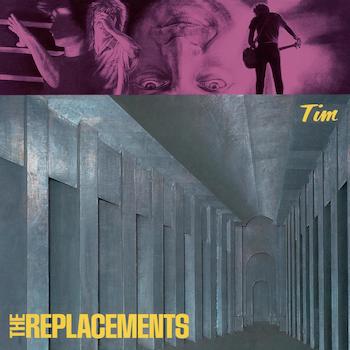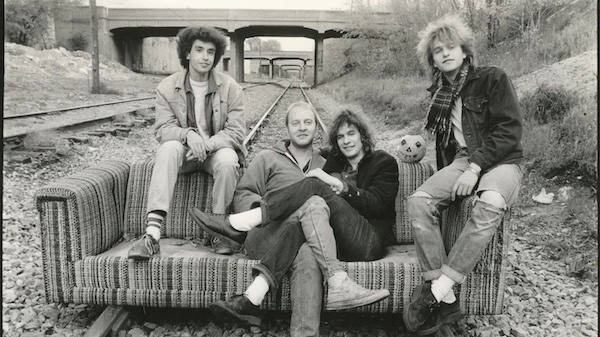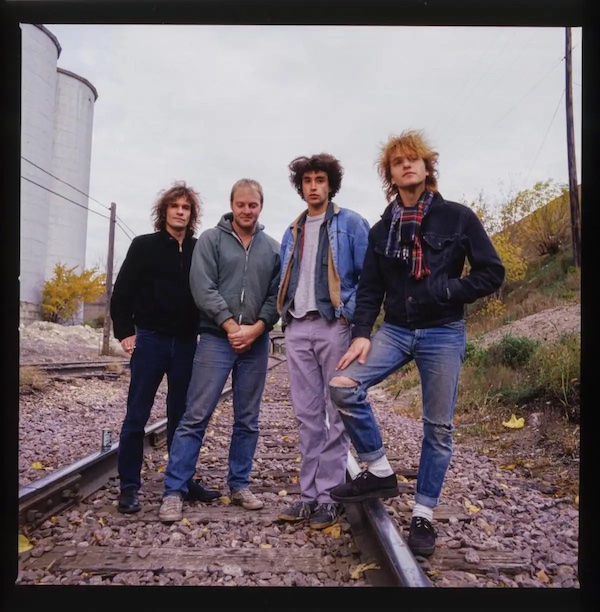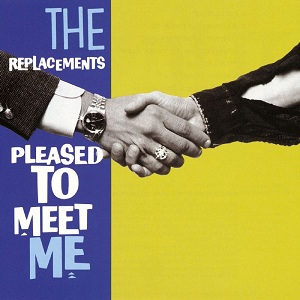Punk Rock Album Review: The Replacements — “Tim” Redux
By Matt Hanson
These new mixes and remixes of the source material, outtakes, and scintillating live cuts show how The Replacements were one of the greatest bands to ever not care much about being one.
 What a glorious, tragic, slovenly, heartbreaking mess The Replacements were! Hailing from Minneapolis, part of an underdog but thriving music scene, their beloved discography has been blessed with a series of extensive reissues over the past few years, from their raw punky beginnings to their more reflective later work, and Rhino records has recently released a vibrant box set for 1985’s Tim: Let It Bleed Edition, their fourth record overall and first great one.
What a glorious, tragic, slovenly, heartbreaking mess The Replacements were! Hailing from Minneapolis, part of an underdog but thriving music scene, their beloved discography has been blessed with a series of extensive reissues over the past few years, from their raw punky beginnings to their more reflective later work, and Rhino records has recently released a vibrant box set for 1985’s Tim: Let It Bleed Edition, their fourth record overall and first great one.
Cheers to Rhino for this typically excellent follow-up to its Pleased to Meet Me rollout a couple of years ago. Both are encouraging people to give both of those excellent records the attention they deserve. These new mixes and remixes of the source material, outtakes, and scintillating live cuts show how the ‘Mats (as their devoted fans like to call them) were one of the greatest bands to ever not care much about being one.
They seemingly had everything: growling riffs, expert pop hooks, punk rock roots mixed with a love of classic rock radio, witty lyrics, and an unpretentious but charming charisma. They could make the walls shake one minute and tear your heart out the next. What went wrong?
Part of the problem is that these mischievous galoots simply didn’t give a fuck. They boozed it up with reckless abandon, harbored serious doubts about being the cash cow for a sleazy label, and they took glee in playing terribly whenever they felt like it. The liner notes by Replacements biographer Bob Meher insists that this prankish indifference applied even during a showcase for major label scouts on the hallowed ground of CBGB’s. Gurgling your way through “You’re A Nasty One, Mister Grinch” strictly for your own amusement to an audience of bored bigwigs isn’t exactly how you grab that golden ticket.
Luckily, the venerable producer Seymour Stein happened to randomly catch them playing their hearts out at a small club a few days later and immediately saw the potential. Tim was supposed to be the band’s breakthrough but, even though it’s packed with killer material, it just wasn’t meant to be.
As the self-deprecating opening to their rousing anthem “Bastards of Young” puts it: “God, what a mess/ on the ladder of success/ where you take one step/ and you miss the whole first rung.” The song has everything you could ask for: an anthemic hook, a swaggering vocal, and real songwriting depth. For example, contemplate this pithy observation: Westerberg sings that “the ones who love us best/ are the ones who we’ll lay to rest/ and visit their graves on holidays at best/ the ones who love us least/ are the ones we’ll die to please/ and if it’s any consolation, I can’t begin to understand.”
You might even catch an echo of George Eliot: “things are not so ill with you and me as they might have been … owing to the number who lived faithfully a hidden life, and rest in unvisited tombs.” Could Westerberg have been curling up with a copy of Middlemarch between gigs? Maybe he didn’t need to.
Kicking the record off, “Hold My Life” is just as catchy, the band’s characteristic cocktail of jauntiness and desperation. Inserting a phrase from an animated kid’s show (“razzle dazzle drazzle drone/ time for this boy to come home”) Westerberg obliquely mentions the dilemma his troupe’s currently in: “we might crack up in the sun/ or lose it in the shade.” Then we get ready for the big chorus: “hold my life/ until I’m ready to use it/ hold my life/ ‘cuz I just might lose it.”
The feigned casualness of the last part stings. Their ace guitarist Bob Stinson, a talented but troubled fellow, would soon be kicked out of the band, partly because of a struggle with addiction. “Dose of Thunder” also mentions the ravages of substance abuse, though you wouldn’t notice it amid the propulsive rhythm. The pun of the title comments on the miserable fate of Johnny Thunders, a member of the key CBGB’s band The Heartbreakers, whose debilitating heroin addiction the Mats referred to years earlier in their somber “Johnny’s Gonna Die.”

The Replacements circa 1985. Photo: courtesy of the artist
The Replacements were always too smart and too sensitive to pretend to be merely drunken buffoons all the time, even if they were. Westerberg couldn’t keep from cursing exuberantly during their only live performance on Saturday Night Live. And then there was the debauchery backstage: it was another major opportunity at the big time inadvertently trashed. Sure, part of the band’s appeal was not to try too hard, but it wasn’t a self-destructive pose they could keep up for long. Sooner or later, the band’s heart was just too big to suddenly stop pumping.
“Kiss Me on the Bus” is a jangly pop ditty that shows their more tuneful side. It serves up a perfect glimpse of what teenage yearning is all about (“ooh if you knew how I felt now/ you wouldn’t act so adult now/ hurry hurry, here comes my stop”). Makes a nice chaser for the almost plaintive “Left of the Dial,” which is about hearing your beloved’s voice on the radio for the first time in months because you’re both touring musicians and this is as much contact as you can have, living song to song on the road. The voice is barely audible over the drone of static on one of the marginal stations designated to play the scruffier, college band types.
The box set includes a scintillating live concert from Chicago, January 1986, a probably frigid night when the boys clearly came to play. Everybody’s working at full capacity; they’re all ferociously in the groove. They cover The Beatles’ “Nowhere Man” and The Rolling Stones’ “Jumpin’ Jack Flash” and Sham 69’s “Borstal Breakout” with panache. You can really feel what it must have been like to have been thrashing along with everyone else. What’s more, you can feel the exultant confidence of a band coming into their own. It might even be a better live document than the superb live show from the venerable New Jersey institution Maxwell’s which came out a few years ago, but why quibble?

The Replacements circa 1985. Photo: Deborah Feingold
Unsurprisingly, people are complaining online that they prefer the original, murkier mix of the material better. Of course, no one’s happy with anything these days, especially audiophiles who take to grouching on social media. I wouldn’t necessarily say that the original version was terrible, and it’s the one I’ve gotten used to. Maybe having one of the Ramones as producer means you shouldn’t expect perfect fidelity. The bonus disc features some interesting tinkering with the songs from a different session produced by the great Alex Chilton, especially the wonderful “Can’t Hardly Wait” which will ultimately be saved for later. It’s fun to hear it go through different iterations, including one take with a perfectly placed cello.
 The new mix by accomplished producer/engineer Ed Stasium is brighter, clearer, and would probably have gone down much easier with the public if it had been the version originally released. Some of the instrumentation, especially Tommy Stinson’s bass, receives more equal space in the mix, which is a real treat. It’s like a rerelease of a version of an old indie film — its print has been cleaned up, scratches and graininess removed. You could say they add character or whatever, and that would probably be a fair point, but sometimes having a widescreen version of an otherwise scruffy indie film isn’t a bad thing.
The new mix by accomplished producer/engineer Ed Stasium is brighter, clearer, and would probably have gone down much easier with the public if it had been the version originally released. Some of the instrumentation, especially Tommy Stinson’s bass, receives more equal space in the mix, which is a real treat. It’s like a rerelease of a version of an old indie film — its print has been cleaned up, scratches and graininess removed. You could say they add character or whatever, and that would probably be a fair point, but sometimes having a widescreen version of an otherwise scruffy indie film isn’t a bad thing.
Then there’s the quietly devastating “Here Comes a Regular” which I actually have tended to skip a lot lately for the simple reason that it’s one of the few songs that will reliably cut me right down to the bone. I just can’t handle it. Wistful, despairing, both prosaically precise and poetically abstract, it’s a song about how we end up wasting our lives in the pursuit of a balm for the pain of wasting our lives. It’s like putting a miniature Chekhov play in a Midwest dive bar. Apparently, everyone was crying after the first time he played it in the studio. I like the image of grizzled punk rockers starting to weep like that.
Great as it is, Tim may not necessarily be the band’s greatest or most cohesive record. Arguably, it is the audaciously titled Let It Be, or my personal favorite, Pleased to Meet Me. Still, this box set proves to be essential listening: it captures the exhilaration of a great band starting to kick it into high gear: figuring out what they want and how to use their own unique, grand, sloppy, brilliant means to get there.
Yes, the original mix is kind of murky, that ugly cover makes less sense than the title does, and they get kicked off the stage just as often as they get called back for encores. But the Tim-era ‘Mats prove there’s plenty of ragged glory in embracing being a gifted screw-up. That’s significant in a culture that obsesses over winning, perfection, and being the best. As one musician fan remarks in the wonderful documentary Color Me Obsessed, being a Replacements fan is like saying “OK, I’m a loser. But I’m the coolest loser around.”
Matt Hanson is a contributing editor at the Arts Fuse whose work has also appeared in the American Interest, the Baffler, the Guardian, the Millions, the New Yorker, the Smart Set, and elsewhere. A longtime resident of Boston, he now lives in New Orleans.
Tagged: Bob Stinson, Ed Stasium, Paul Westerberg, Rhino Records, The Replacements, Tim

I couldn’t get past the crazy notarobot sequence!!!!!!!